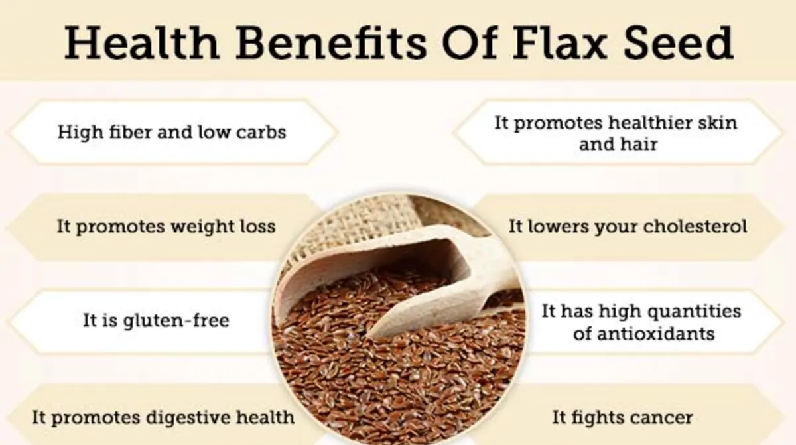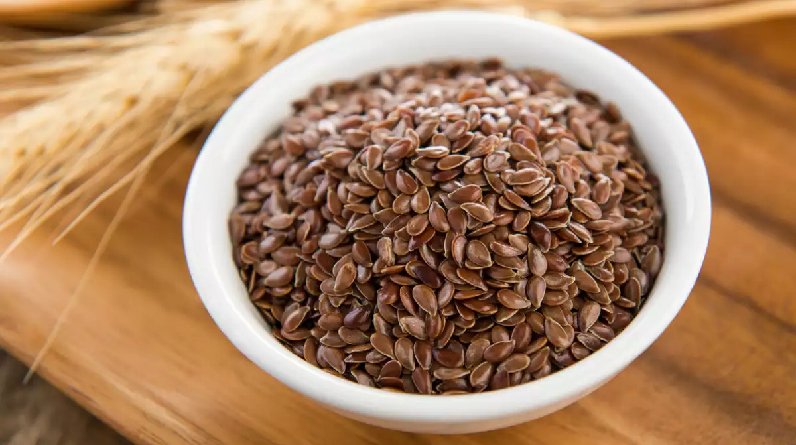The North American flax plant produces tiny, edible seeds known as flax seeds. In addition to imparting a nutty flavour to food, these seeds are a rich source of essential nutrients like fibre, plant protein, and heart-healthy fats. Discover the potential health benefits of flax seeds and easy ways to include them in your diet.
Benefits
Thanks to their many beneficial properties, flax seeds have been rising in popularity in recent years. According to what we know about flax seeds now, they:
Heart health may be boosted by this.
According to the U.S. Centers for Disease Control and Prevention, heart disease is the leading cause of death (CDC). Several studies have shown that eating flax seeds can reduce your risk of developing heart disease.
Bringing down the blood pressure. Clinical Nutrition published a meta-analysis of 15 studies showing that flax seeds lowered blood pressure, especially when taken for 12 weeks or more.
Lowering cholesterol. Fifty adults with high cholesterol were studied, and those who consumed three tablespoons of roasted flax seed powder daily for three months saw significant reductions in total cholesterol and LDL (“bad”) cholesterol levels compared to a placebo group. In addition, their levels of HDL cholesterol (“good” cholesterol) rose.

Foster Digestion and Health
When consumed in the recommended four tablespoon serving size, flax seeds provide 27% of the daily value for fibre.
Some of fiber’s many advantages are, Helping you feel full more quickly, Easing the burden of weight management, Constipation is avoided, and the soluble and insoluble fibre in flax seeds each contribute to better bowel function in their own unique way:
Insoluble fibre adds bulk to stool, which pushes waste through your gut more quickly, relieving constipation. Soluble fibre softens stool and makes it easier to pass through the digestive tract.
You Can Help Lower Cancer Risk
Flax seeds may help prevent or slow the spread of some cancers, though no single food or supplement can guarantee complete protection. The high fibre content of flax seeds, for instance, has been shown to reduce the risk of developing colorectal cancer. Colorectal cancer risk is reduced by 7% for every additional 10 grammes of fibre consumed per day.
Breast cancer is the primary cancer studied in relation to flax seed consumption. Nutrients published a review stating that flax seed consumption may:
- Inhibit the growth of breast cancer cells.
- Stop the spread of breast cancer tumours in women.
- Decrease the probability of death for breast cancer patients.
- Potentially Helps Lower Blood Sugar
- Over the course of 12 weeks, 41 people with obesity and pre-diabetes were randomly assigned to receive either 13 grammes, 26 grammes, or no flax seed at all.
The results showed that the greatest improvements in blood sugar control and insulin sensitivity occurred in those who consumed 13 grammes of flax seeds per day, which is equivalent to about two tablespoons.
Encourage Weight-Control
The soluble fibre in flax seeds may aid in long-term weight maintenance when consumed regularly. When combined with water, the soluble fibre in flaxseeds, known as mucilage (which contains 35-45% fibre), forms a gel. This, according to a 2015 article in the Journal of Food Science and Technology, slows the rate at which food moves through the stomach, making you feel full for longer.
Results from a meta-analysis of 45 studies found that those who regularly consumed whole flax seeds had significantly lower body weights and smaller waist sizes. A higher risk of developing cardiovascular disease and type 2 diabetes is seen in people whose waist circumference is greater than 35 inches for women and 40 inches for men. Patients whose body composition was improved after eating 30 grammes (about three tablespoons) of whole flax seeds per day for more than 12 weeks were also included in the review. What percentage of fat, muscle, and other tissues like bone make up an individual’s total body mass can be determined by analysing their body composition.
Assist in Preventing Long-Term Illness
Flaxseeds are an excellent source of healthy fats and fibre, but they also contain polyphenols, which are powerful antioxidants. The cells in our bodies are constantly under attack from free radicals, oxidative stress, and other environmental factors that can lead to cancer, ageing, and chronic diseases like heart disease.
See Also: We tend to overlook the importance of sign language in the classroom.
Nutrition
Even though flax seeds are quite small, they provide a plethora of health benefits. The nutritional benefits of whole flax seeds that can be obtained from just a quarter cup (about four tablespoons) include:
- Energy: 224
- Fat: 17.5g
- 1.5g of Saturated Fat
- Total Fat: 16g Unsaturated
- Number of milligrammes of sodium: 12.6
- 12 grammes of carbohydrates
- 11.5 grammes of fibre, or 41% of the daily recommended intake (DV)
- No Added Sugars (0g)
- 7.7 grammes of protein.
- 1.69mg of Thiamin 57% DV
- Calcium: 165mg Magnesium: 165mg 39% DV
- Quantity of Selenium Per Day: 7.12mcg 19% DV
- 2.4mg Iron 13% DV
Thiamin, a B vitamin necessary for proper nutrient metabolism and thus energy production, can be found in abundance in flax seeds. Magnesium, an outstanding nutrient of flax seed, is crucial for proper nerve, muscle, and immune system function. 15 On the other hand, selenium prevents cell death and infection. Red blood cells, which transport oxygen throughout the body, can’t be made without iron.
Risks
Despite their low prevalence, flax seed allergies do occur. Subtle amounts of toxins like cyanide may also be present in flax seeds. However, the low levels of cyanide in flax and the fact that the body can eliminate even trace amounts of the toxin make it highly unlikely that flax consumption will lead to toxicity. Furthermore, the chemical is eliminated during cooking of flax seeds.








